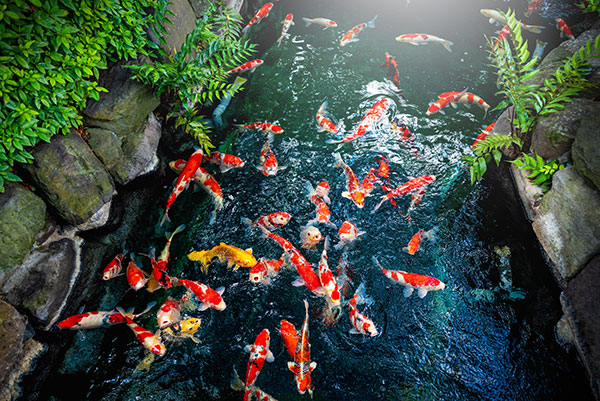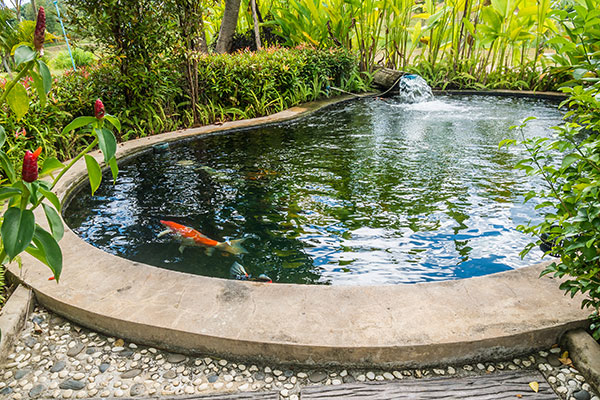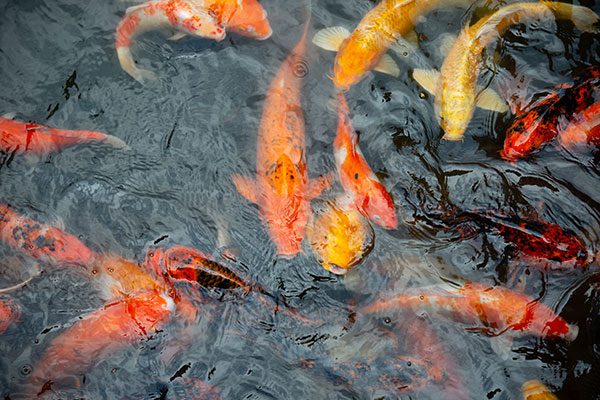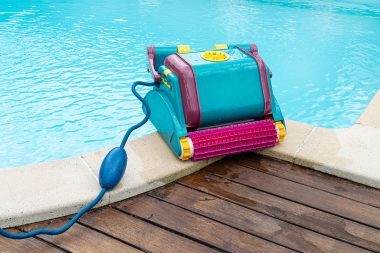Top blog articles
To speak of Koi is to speak of a part of Japanese culture, it represents strength and perseverance in the face of adversity.
Owners can worry about whether their fish can freeze during cold weather or whether a koi can freeze in a pond during the winter and come back to life again after the winter season.
What to do with your Koi pond in winter?

Don’t worry about this, there are solutions to keep your koi from freezing during the winter. These fish have the ability to adapt to difficult temperatures, including winter.
The following recommendations are provided to prevent this from happening.
1. Koi pond heaters
To maintain a constant water temperature. It is important to have a heater according to the size of the pond or fish tank. Some heaters activate when the temperature drops below certain cold temperatures.
Laguna Power Heat Pond Softening Pond Heater
This heater is recommended because it activates by indicating with a LED light when the machine has started to heat up and discard the decomposing organic matter.
2. Relocation
If the pond does not have adequate insulation, these fish can freeze. Koi need at least 1 m depth to survive the winter. If none of the above options are available, relocate them to an indoor pond or aquarium.
3. Cover the pond
Just as a blanket covers you in the winter, you can cover the pond to help retain heat and protect the koi from the cold air.
Koi fish are cold blooded and are susceptible to changes in water temperature. A well-insulated cover will help maintain water temperature.
4. Add plants

Plants release oxygen into the water preventing koi complete freezing during the cold of winter. They absorb sunlight and warm the water, which keeps the pond from freezing. In addition, it will provide shelter for the fish in case you freeze any part of the pond. Adding plants to your koi pond will help keep your fish safe and sound throughout the winter. Additionally, moving water from submerged plants or a waterfall running can prevent complete freezing, creating pockets where fish can access oxygen.
When the water temperature begins to drop, the Koi begin their hibernation process to prepare for winter. They will start to eat more to have a good fat reserve. This helps them to keep warm.
In extremely cold areas, it’s sometimes best to keep koi indoors during winter. However, if you choose to keep them outdoors, ensure the pond has adequate ventilation and aeration with air pumps or de-icers. Koi generally spend most of their time near the bottom of the pond where water is slightly warmer during winter.As the water temperature decreases, they can get down to 36°F, and the koi become less active to conserve energy. They even stop eating, so there is no need to worry because they are probably in their hibernation process. As long as the pond is at the right temperature, nothing will happen.
Can Koi fish survive winter in an outdoor pond?
Absolutely yes! Following these steps ensures koi remain healthy throughout winter. When ice forms on the surface, it restricts oxygen access and traps toxic gases under the ice, which can be harmful. Also, if the pond gets cold enough to form ice, koi fish can freeze and die. Using a de icers to keep a small area ice-free allows for essential gas exchange, keeping koi healthy.
What temperature is too cold for koi?
Koi fish can survive water temperatures up to 36°F. At this point, the koi’s metabolism will begin to slow down and they will become less active. The koi will stop eating and their immune system will weaken. If the water temperature drops further, the koi may go into hibernation or die. Koi cannot reach temperatures of 32°F. This is because koi organisms do not have the enzymes necessary to perform anaerobic glycolysis, which allows them to tolerate low oxygen content and low water temperatures.
Can a koi freeze in a pond during winter?
Yes, if the pond is unprepared, koi can freeze and potentially die if the pond ices over. It’s essential to ensure there’s moving water in the pond, which helps keep oxygen levels sufficient. Additionally, having a hole in the ice, created with a de-icer or air pump, is crucial for ventilation. This allows toxic gases to escape and fresh oxygen to circulate. Koi rely on these methods to stay safe and will often stay at the bottom of the pond in a semi-hibernation state until spring.
Can koi survive being frozen?

Koi fish are very hardy and can survive even the harshest winters. As long as they are provided with a well-warmed pond, they will be fine.
Koi fish cannot come back to life if frozen, fish are cold blooded just like frogs and amphibians. This means that they can be exposed to low temperatures easily but at temperatures below freezing point, they may die.
Koi can also survive winter cold and even freezing water because they have a very special adaptation that allows them to live in colder water: koi produce large amounts of glycerol when they start to freeze. This type of adaptation is very rare among fish and allows koi fish to survive the frigid water temperatures until the koi pond warms up.
One way to bring koi fish “back to life” is to bring them into a warm house or unheated garage and let them slowly increase their body temperature on their own. In this way, you can have a flippered and playful Koi fish again,
Koi fish are very hardy animals, especially Kohaku koi fish. Kohaku koi fish have been bred for hundreds of years because Kohaku koi are often the koi fish chosen to represent koi at koi shows. This koi breed is very hardy, Kohaku koi are able to survive cold water temperatures and even sub-zero temperatures.
Read more: How to insulate exposed water pipes
What happens if my koi pond freezes over?
If the pond freezes over, the fish will suffocate and die because no fresh oxygen is getting to them. If the pond freezes over and the fish are left under a large layer of ice, they will die. These fish are cold-blooded, so it is difficult for them to extract oxygen from the water, which is why they cannot swim that foot deep in the ocean.
When a pond freezes over, an anaerobic environment is created that does not allow gases and wastes to escape from the fish, causing contamination of the pond.
How long can koi fish live in a frozen pond?
If winter care recommendations follow, koi fish can live comfortably and survive. In the event of a partial freezing of the pond, fish can survive for 90 days.
How long can a koi fish remain frozen and come back to life?
The truth is that koi fish cannot freeze completely and come back to life. A koi fish that really got frozen for more than 5 minutes will have died.
If a koi fish is completely frozen and thawed quickly in a proper manner, it is possible that it will survive the ordeal. Otherwise, it will most likely not survive the thawing. This is because koi fish, like many other cold-blooded animals, freeze internally in the spaces surrounding their cells.
Koi fish can survive in ponds during the winter outdoors and harsh winters as long as they have the amenities and the owners ensure that they have a system that is well adapted to their needs and requirements.
Bottom line
Taking care of your koi pond during winter requires attention to details like maintaining ice for gas exchange or using a de-icer to keep a hole in the ice. By ensuring adequate moving water and managing ventilation with tools like air pumps, you can prevent the build-up of toxic gases and support your koi’s immune systems. Remember, koi will spend most of their time at the bottom of the pond during the winter, when temperatures are slightly warmer. Following these steps will help your koi stay healthy and safe, allowing them to thrive again come spring.










Your opinion matters, leave a comment